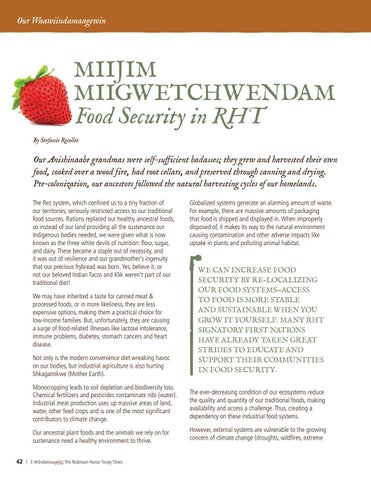Our Waawiindamaagewin
MIIJIM MIIGWETCHWENDAM Food Security in RHT By Stefanie Recollet
Our Anishinaabe grandmas were self-sufficient badasses; they grew and harvested their own food, cooked over a wood fire, had root cellars, and preserved through canning and drying. Pre-colonization, our ancestors followed the natural harvesting cycles of our homelands. The Rez system, which confined us to a tiny fraction of our territories, seriously restricted access to our traditional food sources. Rations replaced our healthy ancestral foods, so instead of our land providing all the sustenance our Indigenous bodies needed, we were given what is now known as the three white devils of nutrition: flour, sugar, and dairy. These became a staple out of necessity, and it was out of resilience and our grandmother’s ingenuity that our precious frybread was born. Yes, believe it, or not our beloved Indian Tacos and Klik weren’t part of our traditional diet! We may have inherited a taste for canned meat & processed foods, or in more likeliness, they are less expensive options, making them a practical choice for low-income families. But, unfortunately, they are causing a surge of food-related illnesses like lactose intolerance, immune problems, diabetes, stomach cancers and heart disease. Not only is the modern convenience diet wreaking havoc on our bodies, but industrial agriculture is also hurting Shkagamikwe (Mother Earth).
42
Globalized systems generate an alarming amount of waste. For example, there are massive amounts of packaging that food is shipped and displayed in. When improperly disposed of, it makes its way to the natural environment causing contamination and other adverse impacts like uptake in plants and polluting animal habitat.
WE CAN INCREASE FOOD SECURITY BY RE-LOCALIZING OUR FOOD SYSTEMS—ACCESS TO FOOD IS MORE STABLE AND SUSTAINABLE WHEN YOU GROW IT YOURSELF. MANY RHT SIGNATORY FIRST NATIONS HAVE ALREADY TAKEN GREAT STRIDES TO EDUCATE AND SUPPORT THEIR COMMUNITIES IN FOOD SECURITY.
Monocropping leads to soil depletion and biodiversity loss. Chemical fertilizers and pesticides contaminate nibi (water). Industrial meat production uses up massive areas of land, water, other feed crops and is one of the most significant contributors to climate change.
The ever-decreasing condition of our ecosystems reduce the quality and quantity of our traditional foods, making availability and access a challenge. Thus, creating a dependency on these industrial food systems.
Our ancestral plant foods and the animals we rely on for sustenance need a healthy environment to thrive.
However, external systems are vulnerable to the growing concern of climate change (droughts, wildfires, extreme
| E-Wiindamaagejig: The Robinson Huron Treaty Times















